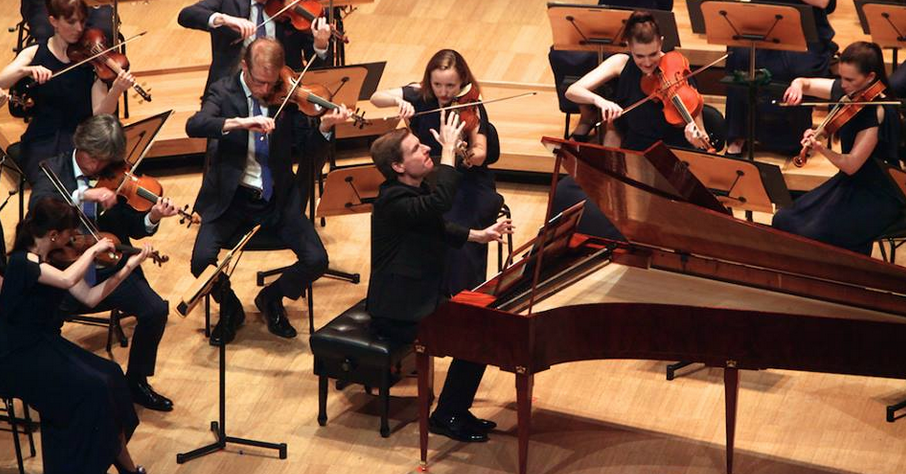★★★★½ Kristian Bezuidenhout paints a portrait of Amadeus in his own time.
City Recital Hall, Angel Place, Sydney
September 11, 2015
If there’s one thing that musos could teach the pollies it’s that the team that plays together stays together. Nothing demonstrates that as clearly as when the conductor (to quote Malcolm Turnbull) is first among equals, and nothing epitomises that philosophy quite like the orchestras of the 18th century. Acknowledged virtuoso and genius composer though he was, Mozart probably never stood in front of an orchestra, let alone sat in an audience for his music. No, dutifully tucked away at his keyboard he would have coaxed and cajoled his ensemble forward, much as Kristian Bezuidenhout does in this Australian Brandenburg Orchestra programme of Wolfgang Amadeus and his contemporaries.
The concert opened by contextualising the main compositional draw with works by a pair of Bach’s sons and musical heirs. Johann Christian, the English Bach, was JSB’s youngest son and a huge influence on the young Mozart. An uncomplicated sinfonia, written two years before the famously reported meeting where the young Wolfgang perched on his knees, revealed JC’s warmly melodic style. With its gorgeous Andante (the ABO strings on terrific form) and rollicking hunting call Finale it could easily have been a piece of early Mozart. A performance full of verve and vim left me reflecting that we really don’t hear enough JC Bach. Music by the eldest Bach followed – Wilhelm Friedmann – and a delicately textured sinfonia for two flutes and strings, balanced by Bezuidenhout with great skill.

Mozart’s Piano Concerto No 20 in D Minor came from his most fertile period devoted to his own instrument, a time that saw a remarkable 15 concertos in four years! Not that it shows any signs of haste. It opens with a darkly operatic introduction – shades of Don Giovanni to come, but also pre-echoes of Beethoven – the ABO sounding satisfyingly full and fat of tone. Angled sideways on, the challenge of wrangling the fortepiano was fascinating to observe as Bezuidenhout’s delicate hands raced across what seemed like an unfeasibly small keyboard. The sound conjured forth was light and lyrical, both commanding and rewarding our full attention. If any pianist can truly be said to channel Mozart today it’s Bezuidenhout, stylistically attuned, yet unafraid to personalise the music with a suspension here, a sudden dynamic shift or an gracefully spread chord. His manual dexterity is a thing of wonder, the leather hammers of the fortepiano aiding the crystalline articulation.
The famous Romance swelled from keyboard to full orchestra in a lovely reading where the soloist seemed to play hide-and-seek with the limpid strings. The Rondo finale was all rushing violins, baying horns and dramatic timpani. Bezuidenhout took it at a remarkable lick, his hands racing up and down the keyboard, his fingers nimbly picking out the brooding solo part. A thoroughly idiomatic cadenza (the invention of the soloist himself) led to a cheeky, insouciant finish and well-deserved rapturous applause.
The second half gave Bezuidenhout the chance to direct the Linz Symphony from the keyboard, much as Mozart would have done. He gave it a correspondingly bright reading appropriate to its buoyant key of shiny C Major, his rear view bouncing along on the piano stool conveying almost as much excitement as the music itself. The orchestra really came into their own here with (to use a butcher’s analogy) beefy yet lean strings and punchy woodwind and brass. The stately Andante was followed by a crisp and bubbly reading of the Minuet before the breakneck Presto, with themes flying left and right around the orchestra, powered the Brandenburgers across the finish line.
Paul Dyer’s increasingly impressive roster of ABO guest directors goes from strength to strength and this delicious affair was programming and playing with a real sense of authenticity. Highly recommended.
The Australian Brandenburg Orchestra present Mozart’s Fortepiano until September 19.











Comments
Log in to join the conversation.